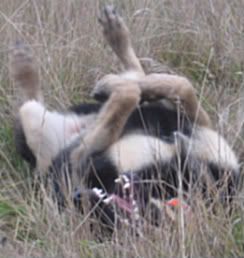From yourpetsbestfriend.com comes this somewhat graphic and nuts-and-bolts explanation of how HW treatment works and why the restrictions on the dog's movements, etc., are necessary. It's educational but sobering.
It's the best lay explanation of the treatment I came across and really made vivid to me all the vet manual articles.
The O.P. and I discussed this before I posted it.
QUOTE:
The perfect treatment for a disease needs to satisfy several requirements: the treatment should be 100% effective and it should be completely safe for the patient. If it were also easy to do, and inexpensive, that would be perfect. When the standard treatment for a disease fails to satisfy all four of those requirements, people begin to look for alternatives. Sometimes this results in better treatments. Sometimes it results in the patient receiving no effective treatment because he's busy getting some quack remedy that does nothing at all (or kills him. Remember Laetrile?).
Treating a dog to clear him of heartworms is a situation where the state of the art is not perfect. Prevention of the disease with monthly preventive medicine has been effective most of the time. Treating the dog who has adult, foot-long worms in his heart -- that's a different story.
The conventional view is that the worms are in the right ventricle of the heart, and the big pulmonary artery trunk. If you do a post-mortem on a dog who has died from heartworms, you'll find a lot of them there. In a dog with a lower worm burden, there are not so many worms in the heart.
Most of the worms will actually be in the pulmonary arteries (taking blood from the right side of the heart to the lungs to get oxygen). There may not be any worms in the heart. If you open this dog at post-mortem, even though there may not be huge numbers of worms, you can cut the lung way out at the edge and find worms in the blood vessels.
The worms don't eat the heart or arteries, they just float. When there are so many worms present that they clog the outflow from the heart (like roots in a pipe), the heart wears out (prematurely) from the constant overwork of pushing blood through the clog.
Actually the worms don't just float -- they swim upstream. If they just floated, the pressure in the artery would force them downstream until they hit a branch too small to pass. This would clog the artery either partially or completely, resulting in poor circulation to the downstream area of lung. The dog might get a secondary pneumonia in this damaged area. If he ran hard, increasing heart rate and blood pressure, the damaged artery could blow out, hemorrhaging into the lungs. Indeed this does happen in some dogs, though most infected dogs develop the less dramatic signs of congestive heart failure: weight loss, coughing (especially after exercise), labored breathing, fainting spells and so forth.
This is ALWAYS what happens when the dog is treated to kill the heartworms. Worms who have been swimming upstream, keeping the artery open, float downstream and clog up the works. Unlike an intestinal worm infection (hookworms, roundworms, tapeworms, etc.), there's no exit here. With intestinal worms, you kill the worms and they leave the body with the next bowel movement. With heartworms, they clog up the works like a blood clot would (except that few blood clots are a foot long). You've heard that you shouldn't get an air-bubble injected -- how about a handful of foot-long worms? The only way to get rid of them is to let the body's microscopic white blood cell defenders eat them. They'll do it, but it's a slow process, like termites eating your house. It takes weeks after the death of the worms before the body dissolves them out of the circulation and opens all those clogs.
This is the unsatisfactory part of the heartworm treatment. It's why dogs feel bad a week or so after they are treated. That's when the worms die and shift position. The dog may have a fever, cough, lose appetite, have trouble breathing, or cough up blood. Sometimes you don't see any of those things, but you can just tell that your dog doesn't feel good. You know your dog, and even though he may not have specific signs, you can tell when he doesn't feel well. This is the reason we ask you to restrict the dog's activity for several weeks after treatment -- no hard running for a while.
Most complications of treatment are minor and very treatable. Severe problems like blood-vessel rupture or allergic-shock-like reactions are extremely rare. It could happen, but most dogs have years added to their lifespan when the heartworms are destroyed.
Here's the crux of the matter, and the reason I'm writing today. Ill effects during the heartworm treatment are related almost exclusively to the dead worms clogging up the pulmonary arteries. The drug that's used (Immiticide TM - melarsomine dihydrochloride) is unlikely to cause anything worse than some temporary soreness at the injection site. It takes those little worms five days to die and they're taking a bath in it. There just isn't enough drug to bother the dog (unless he has some pre-existing severe liver disease). That's why it doesn't matter whether your alternative remedy is a better chemical, a cheaper chemical, organic, holistic, homeopathic, herbal or black magic. If it kills the worms, the arterial blood pressure is going to shoot them downstream and clog up the works.
I've seen people use D-con rat poison, gunpowder, and levamisole (a sheep-wormer that is VERY hard on the dog's liver). Today a client brought in some misinformation he'd downloaded from some "Natural" website (with many products for sale). Their nostrum is alleged to be superior because "There seems to be no risks of the parasites dislodging and creating vessel blockage." Yeah? Do the worms die or don't they? If they die, they're going to move. You may not have seen an artery pumping, but a two-millimeter artery will shoot three feet in the air if your clamp slips off before you get it tied. Dead worms don't swim - they go scooting downstream.
I wish that our standard heartworm treatment was 100% effective, safe, easy and inexpensive. It doesn't totally satisfy any of those criteria. It is usually effective in eliminating all the worms, most dogs have no complications (or very minor and easily treatable ones), and it just takes two injections, 24 hours apart. But, it's not cheap. And you have to let the body deal with those dead worms. There's just no way around that, no matter how you kill them. END
 Previous Topic
Previous Topic Index
Index Next Topic
Next Topic












 Top
Top



.jpg)
.jpg)

